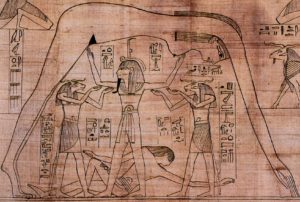Mythology
The collectively created and collectively used cultural output of thousands of generations of human beings.

The air god Shu, assisted by other gods, holds up Nut, the sky, as Geb, the earth, lies beneath. Photographed by the British Museum; original artist unknown [Public domain], via Wikimedia Commons
Mythology is the study of the myths, art, and/or rituals associated with specific cultures over multiple generations. Interwoven cultural materials taken together form a mythic system or world view in which the individual and the community interact with each other and the world at large.
Mythologist
One who works with mythic artifacts to create multifarious awareness of oneself and the world around us to create balance in our ways of knowing and living on the planet.
A lover and/or student of mythology who reveals in uncovering the myths entwined in and influencing our lives.
What Does a Mythologist Do?
- Teach workshops on mythology.
- Write essays, research papers, and fiction.
- Help others learn how to tap into humanity’s mythic heritage and incorporate the mythic imagination into our daily lives.
- Integrate mythology into western culture.
To see upcoming public workshops, visit the Events page. Interested in a custom developed workshop? contact Karin.